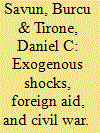| Srl | Item |
| 1 |
ID:
188180


|
|
|
|
|
| Summary/Abstract |
Diasporas do not arise from fixed connections to objective circumstances such as dispersion or relation to a homeland, but instead constantly are negotiated and re-constituted. Ranging from internal gradual change to sudden exogenous change, the re-making of a diaspora can take diverse forms. Despite the prevalence of constructivist and processual approaches, however, research on diaspora identity change has been limited. This paper takes a comparative historical perspective to the post-2016 diasporization of the Gülen Movement (GM) and discusses how the GM responded differently to sudden exogenous shocks in 1997, 2007, and 2016. In both historical institutionalism and rational choice theories, the sudden exogenous shocks do the heavy lifting to explain change; however, it is rather the endogenous parameters that account for the variation in the GM’s responses to those shocks.
|
|
|
|
|
|
|
|
|
|
|
|
|
|
|
|
| 2 |
ID:
123337


|
|
|
|
|
| Publication |
2013.
|
| Summary/Abstract |
This paper applies the narrative approach to Chinese monetary policy to solve two problems of policy measurement. The first problem arises because the PBC (the Chinese central bank) applies multiple instruments and none of them alone can adequately reflect changes in its monetary policy. The second one is the classical identification problem: the causation direction of the observed interaction between central bank actions and real activity needs to be identified. The PBC's documents are used to infer the intentions behind policy movements. Three shocks are identified for the period 2000-2011 that are exogenous to real output. Estimates using these shocks and various robustness tests indicate that monetary policy has large and persistent impact on output in China.
|
|
|
|
|
|
|
|
|
|
|
|
|
|
|
|
| 3 |
ID:
114185


|
|
|
|
|
| Publication |
2012.
|
| Summary/Abstract |
The recent civil war literature suggests that negative economic shocks in low-income countries increase the risk of civil war. Foreign aid can be an effective conflict-prevention tool in times of severe economic conditions. Aid cushions government spending from the downward pressures of economic shocks, providing recipient governments with resources they can use to make rebellion a less attractive option for aggrieved domestic groups. Using Official Development Assistance (ODA) data covering 1990 through 2004, we find that foreign aid appears to be a useful tool for preventing civil wars in the wake of negative economic shocks, and as such aid should be assessed by donors with these conflict-suppressing aspects in mind.
|
|
|
|
|
|
|
|
|
|
|
|
|
|
|
|